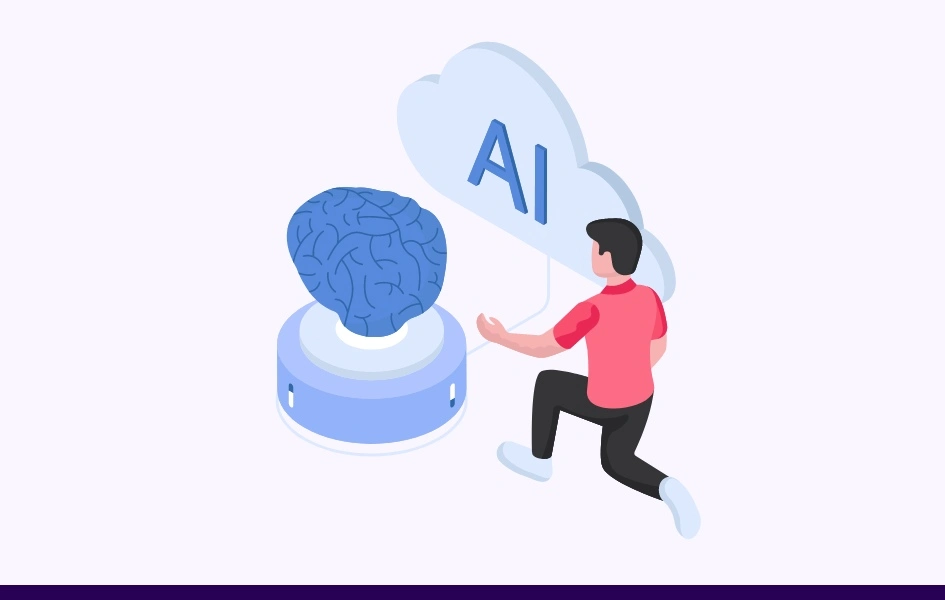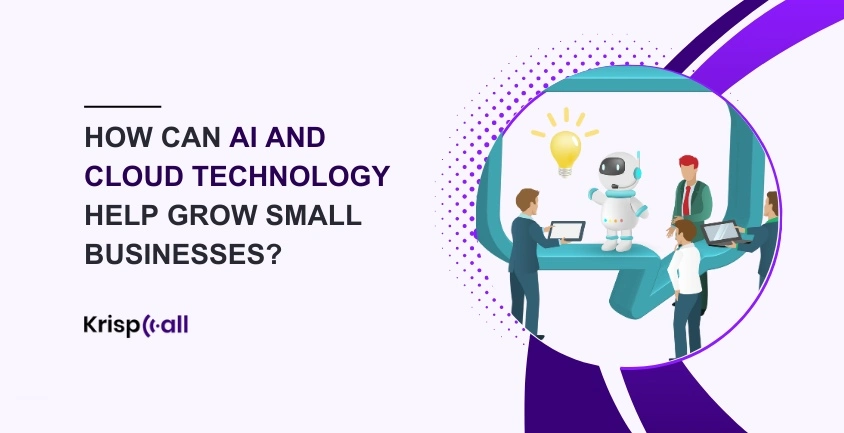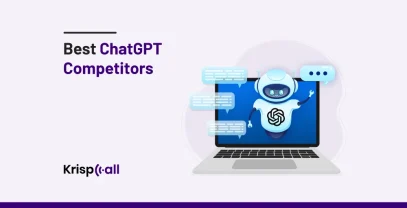In today’s fast-paced digital technology, small businesses face various challenges with limited resources. Modern customers and clients want their tasks done faster and more smoothly. With traditional business operational methods, not only customers it won’t satisfy employees either.
So, what’s the solution to this? 🤔Don’t worry! New advanced technologies like AI 🤖 and Cloud-based services have been game-changing due to AI capabilities in machine learning, predictive analysis, NLP, and cloud-based capabilities like application deployment, which provide cost-effective solutions for data storage and collaborative and productive tools.
In this blog, you will get detailed information about the definition of AI and Cloud Technology, their benefits, examples, roles in cloud computing, and most importantly, how they help grow small businesses. From improving the decision-making process to enhancing customer service and ensuring business continuity, you’ll learn how AI and cloud technology can 🚀skyrocket small businesses to thrive in the digital age and ultimately succeed.
🔑KEY HIGHLIGHTS
- AI-Driven Cloud Services has advanced capabilities, such as speech recognition, machine learning, NLP, and many more, to enhance customer engagement and operational efficiency.
- AI enhances user experience, data security, analysis, cost, optimization, and intelligent automation in a cloud-based environment.
- AI and Cloud Technology empower employees by eliminating geographical barriers, optimizing marketing and sales operations, streamlining automation, and providing 24/7 custom support.
- Leveraging AI for predictive analysis, forecasting trends, and customer behavior can help improve overall decision-making.
- AI-powered chatbots can understand customer sentiments and provide personalized recommendations to increase customer satisfaction, loyalty, and sales.
- The seamless integration of AI and Cloud services can help analyze data from various sources, including social media sentiments, customer interactions, deeper insights, and a more
What is AI Cloud?
AI Cloud is the process of combining AI-driven cloud services and solutions to deliver AI capabilities such as speech analytics, computer vision, machine learning, and NLP (Natural Language Processing). It can integrate with various cloud services, such as databases and IoT platforms, and facilitate collaboration by allowing multiple users to access various projects and work on them from different locations.

AI Cloud is used in various business organizations for customer engagement, decision-making, customer service, data analytics and business intelligence, healthcare and life sciences, etc. By leveraging AI Cloud services, businesses can gain a competitive advantage, create AI strategies, or enhance customer experience and operational efficiency.
Businesses can leverage AI cloud services in various ways, such as automating repetitive tasks through Robotic Process Automation, which involves data entry, customer support, and invoice processing. Also, Combining IoT devices to monitor equipment, reduce downtime, and use various machine learning models to detect anomalies can help prevent potential issues.
An example of the AI Cloud is
“A small retail business aims to improve customer experience by providing personalized product recommendations. Then, the business can analyze the customer behavior, preferences, and purchase history by leveraging Google’s AI Cloud to generate accurate and personalized recommendations.”
What are the Roles of AI in Cloud Computing?
AI and Cloud Computing are 2 essential terms in today’s world of IT technology. Artificial Intelligence plays a major role in the field of cloud computing. It helps to increase efficiency and streamline the process to foster a dynamic IT infrastructure.
Some of the major roles of AI in Cloud Computing are as follows:
1. Enhanced User Experience and User Interface (UI/UX)
AI can personalize the user experience through cloud platforms, with AI-powered chatbots that can answer customer queries and provide support based on their needs. With machine learning platforms, users can see past interactions, preferences, and usage patterns, so AI can help build a unique profile for each cloud user.
AI can anticipate the user’s needs and suggest relevant resources. Not only user experience, it also personalizes an enhanced user interface by engagingly answering customers’ queries and customizing the interface by using larger icons and fonts, screen pop-up options, notification alerts, and dynamic layouts that can engage the cloud users.
2. Data Security & Detection of Threats
With the help of AI, it can monitor or safeguard the cloud environment by applying algorithms that can analyze vast amounts of data on system logs and network activities. It can predict potential cyberattacks and emerging threats like unusual login attempts and unauthorized access to important data.
AI predicts potential issues and implements security measures to mitigate risks. It can trigger automated responses whenever it detects a security threat. AI helps maintain robust security for cloud environments by monitoring and adapting to new threats.
3. Data Analysis & Insights
AI plays a transformative role in data analysis by utilizing various deep-learning platforms and machine-learning techniques. This can reveal various hidden patterns and trends that might be missed by human data analysts.
AI can also be used for predictive analysis and forecasting future product and service trends. Moreover, it helps predict customer churn rates and assess potential risks and threats associated with financial transactions and equipment failures.
4. Cost Optimization & Resource Management
AI plays a significant role in enhancing cloud computing in various areas of cost optimization and resource management. It can analyze and optimize the workloads, ensuring they run on the most cost-effective infrastructure. The algorithms can help minimize downtime and maximize the use of cloud resources by predicting hardware failures.
Leveraging AI for resource management and cost optimization can make cloud computing more cost-effective and efficient. Automation and predictive capabilities can enable better decision-making and enhance the overall cloud infrastructure performance. It can monitor real-time cloud spending, providing important insights and alerts on unusual expenditures or trends.
5. Intelligent Automation
Artificial Intelligence can streamline workflows by enabling faster and more efficient operations by automating repetitive tasks. AI tools and algorithms can identify test failure patterns and suggest potential fixes, then alert developers about the critical issues that need the most attention.
AI can help manage application deployment automatically. It ensures the deployment process follows best practices and policies. It can also learn from past failures to improve future deployment strategies. It can identify potential issues before impacting the users. Also, it can maintain optimal performance by dynamically adjusting the resources and configurations.
What are the Advantages of AI and Cloud Technology for Small Businesses?
Integrating AI and Cloud Technology can benefit small businesses by enhancing operational efficiency and providing an intelligent customer experience. Cloud Technology allows enterprises to scale IT resources based on the demand. Some of the advantages of AI and Cloud Technology for small businesses are as follows:
1. Improved Decision-Making Process
AI can help small businesses make informed decisions about customer engagement, marketing strategies, and inventory management. Predictive AI-driven analytics can forecast future trends, customer behavior, and demand, enabling small-scale businesses to adjust their marketing strategies and operations.
Accurately analyzing vast amounts of data can help small enterprises leverage data from sales, customer interactions, social media, and market trends.
2. Cost-Effectiveness
By leveraging cloud technology or services, small businesses can avoid the high upfront costs of maintaining and purchasing data centers and physical servers. AI tools and solutions can easily automate routine tasks, reducing additional staffing needs and minimizing operational costs.
Cloud services allow small businesses to pay only for the resources they use. This ensures flexibility for small-scale enterprises as they can scale their needs according to demand without incurring unnecessary costs.
3. Global Accessibility & Collaboration
Cloud Technology can enable small businesses with distributed teams to access data and applications from anywhere with an internet connection. It can facilitate proper remote workforce management. It’s beneficial for small enterprises looking to expand their reach.
Collaboration tools like project management, shared documents, and video conferencing can enhance teamwork and communication. Cloud platforms like Asana, Trello, Google Meet, Slack, etc., make this possible. They help simplify task assignments and monitor progress. They can benefit small businesses with increased productivity, improved customer responsiveness, and faster decision-making.
4. Business Continuity
Cloud technology can offer various robust backup solutions that protect business data from loss due to natural disasters, cyber-attacks, and hardware failure. Automated backup solutions like end-to-end encryption, snapshot technology, data archiving, etc., can protect business data from cyber threats, ensuring small businesses can quickly recover and continue operations.
These solutions ensure data is backed up without manual interruption, reducing the risk of data loss. Storing backup data in multiple geographically dispersed data centers can protect it from natural disasters. These cloud-based backup solutions can empower small businesses to maintain uninterrupted operations and safeguard their continuity in today’s dynamic business landscape.
5. Access to Advanced Technologies
Cloud Platforms can access advanced technologies like Automatic Speech Recognition, Machine Learning, AI, and Big Data Analytics. Leveraging these technologies can unlock innovation and growth for small businesses to incorporate intelligence into their applications without extensive data science expertise.
Similarly, Machine learning services can enable small businesses to develop predictive models, automate processes, and optimize operations. This can improve various areas, such as inventory management, fraud detection, customer churn prediction, etc.
How AI and Cloud Technology are Transforming Small Businesses?
AI and Cloud Technology are two evolutionary forces for small businesses. AI can empower employees and analyze real-time data, providing insights into customer behavior, market trends, and operational performance.
AI and Cloud Technology are transforming small businesses in various ways. Here are some of the major strategies on how they are revolutionizing small businesses:
1. Employee Empowerment
Employee Empowerment is a crucial aspect of transforming small businesses through AI and Cloud Telephony. AI and Cloud Technologies can become powerful assistants for small businesses with fewer employees, boosting employee morale and sparking innovation.
The human-AI collaboration helps create an engaged and innovative workforce by learning new skills, freeing up valuable time for employees, and reducing information overload.
2. Eliminating Geographical Boundaries
Another way to transform small businesses is by eliminating geographical boundaries or breaking down barriers. Cloud technology and AI can help to break down barriers by cost-effectively recruiting remote workers from all over the world.
Forming virtual teams can help build a team with diverse expertise without the need to be in the same physical location. By building a global team, small-scale enterprises can reach a wider customer base and compete with larger-scale businesses. Thus, this can open doors to new opportunities and fuel business growth.
3. 24/7 Customer Support
With many customers and clients, small businesses with fewer employees might find it challenging to communicate with all of them. Cloud-based tools ensure the data is always accessible and operate 24/7 hour.
AI-powered Chatbots can help provide 24/7 customer support by providing personalized interactions and driving customer engagement and retention rates. Team members can collaborate with one another through cloud-based platforms like chat and video conferencing to resolve customer queries for seamless customer communication.
4. Marketing and Sales Optimization
AI and Cloud Technology can help grow small businesses through marketing optimization by analyzing customer data and information, including purchase history, demographics, preferences, needs, search history, and online behavior. Small-scale businesses can create targeted marketing campaigns and measure or improve sales performance.
AI can also personalize the customer journey across various channels, such as websites, email, and social media. This involves recommending products based on past purchases and sending personalized discounts on festival offers, birthdays, etc. Cloud-based CRM systems can integrate with AI capabilities to drive higher sales and customer retention rates for small businesses.
5. Streamlined Operations & Automation
Lastly, Streamlined Operations and Automation are other essential points not to be missed that can help grow small businesses. AI and Cloud-Based phone systems can help small businesses automate various operational processes, reduce manual workload, and increase efficiency.
The AI-driven tools can automate various tasks such as payroll processing, inventory management, customer support, and invoicing. Small businesses can focus on higher-value tasks and create strategic approaches by automating routine business activities and operations.
Conclusion
Small Businesses can surely grow their business with the use of AI and Cloud Technology. With the above-mentioned points, they can enhance efficiency, enable innovation, and operate more effectively. Also, they can have chances to compete with larger enterprises and create new business opportunities for growth and success.
Small businesses can have a competitive edge and innovation by utilizing AI-driven tools and cloud services to innovate and develop new products or services to maintain the market’s competitive edge. The scalability of cloud infrastructure allows businesses to adapt to changing market demands and trends and scale their operations.
With the help of AI and cloud technologies, small-scale businesses can better navigate the complexities of the modern business landscape, achieve sustainable growth and success, and seize new business opportunities. By embracing these technologies, they can foster innovation and competitiveness.
FAQs
What are the future AI trends for a small business?
There are many exciting future AI trends applicable to small businesses. Some are Integrating Cloud Services with IoT (Internet of Things), AI-driven Forecasting and Optimization, Multimodal AI, and Generative AI for Content Creation.
What performance metrics can small businesses monitor while using AI and cloud services?
Small businesses can perform various variety of performance metrics like cloud service metrics, which include latency, cost budget management, data transfer costs, scalability, elasticity, etc, and business impact metrics, which include customer retention and acquisition, Return on Investment, Revenue Growth, Innovation Rate, etc.
What challenges might small businesses face while implementing AI and cloud services?
There can be several challenges small businesses might face while implementing AI and cloud services, including evaluating ROI, data quality and quantity, data security and privacy, service downtime and reliability, etc.





